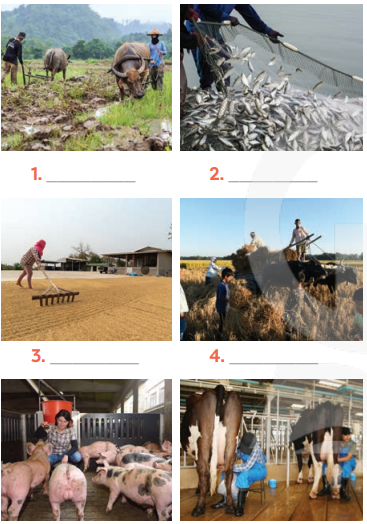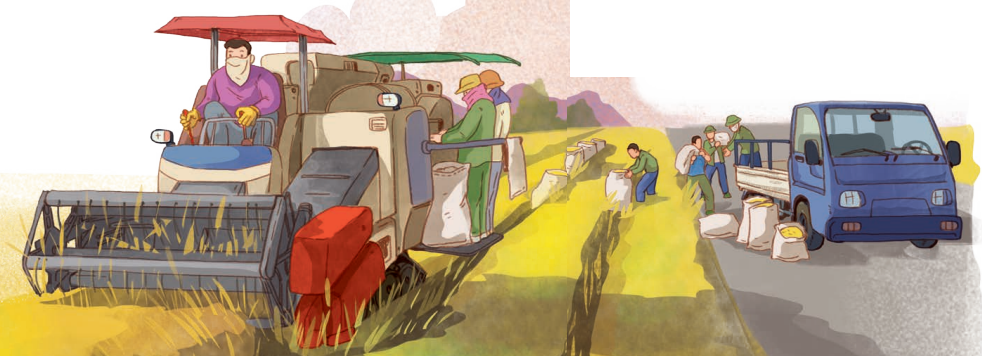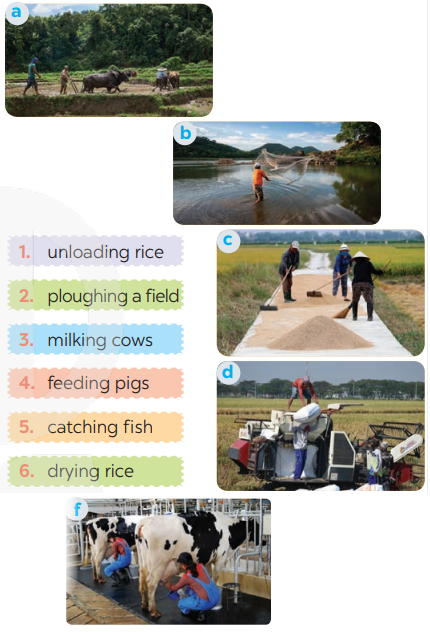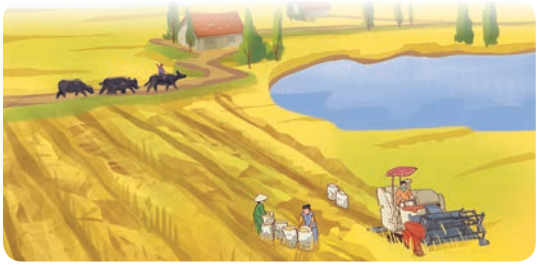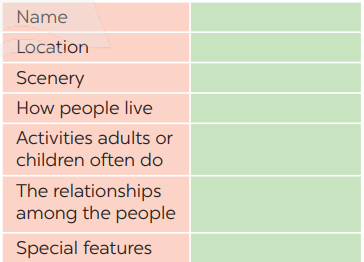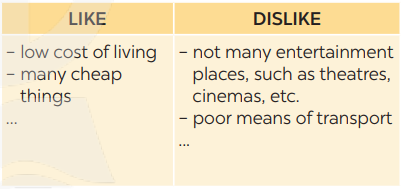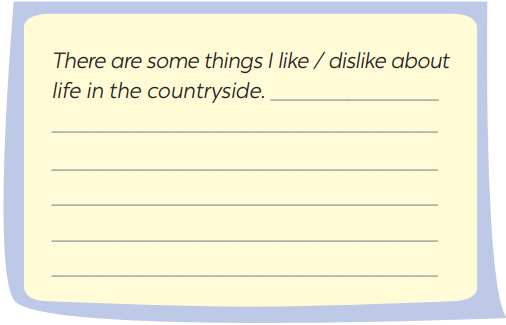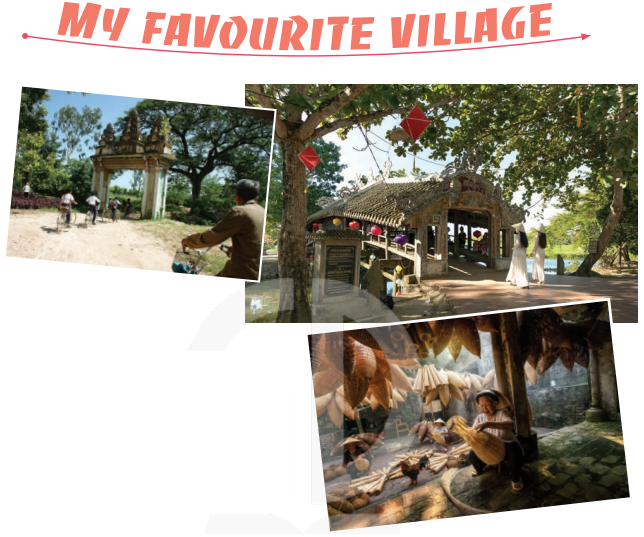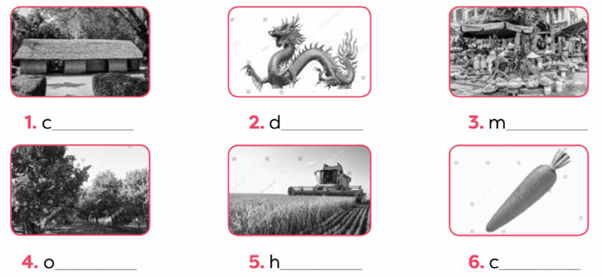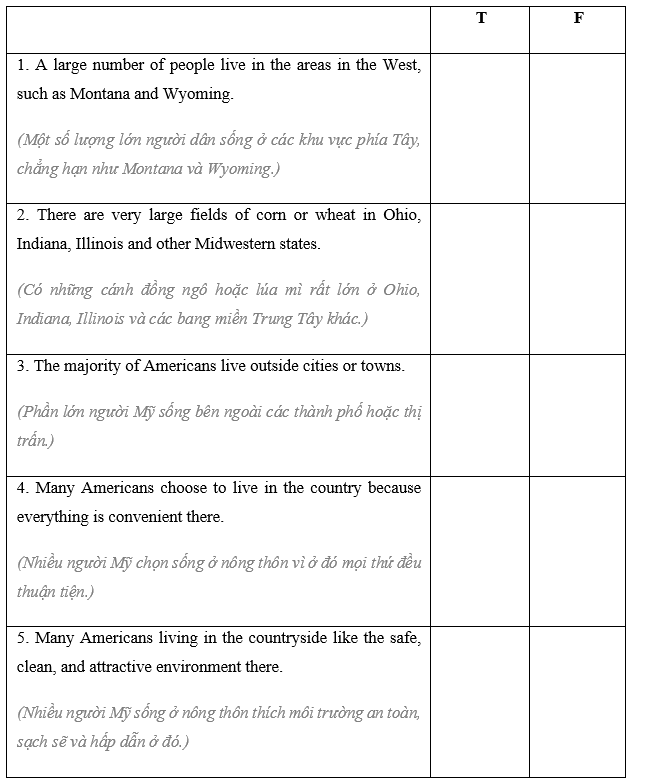Giải SGK, SBT Unit 2. Life in the countryside Global Success
Giải SGK, SBT Unit 2 Global Success
3. Complete the sentences with the words and phrases from the box.
(Hoàn thành các câu với các từ và cụm từ trong khung.)
|
paddy field herd load harvest time combine harvester |
1. It took them an hour to _____ all the goods onto the truck.
2. Nowadays, people in my village use a _____ to harvest their rice and separate the grains from the rest of the plant.
3. Today it is my turn to _____ the cows.
4. A place in which people grow rice is called a _____.
5. A busy time when people cut and gather their crops is called _____.
2. Match the following adjectives with their definitions.
(Nối các tính từ sau với định nghĩa của chúng.)
|
1. vast |
a. pretty, especially in a way that looks old-fashioned |
|
2. hospitable |
b. having something near or around |
|
3. well-trained |
c. extremely large in area, size, amount, etc |
|
4. surrounded |
d. pleased to welcome guests; generous and friendly to visitors |
|
5. picturesque |
e. having received good or thorough training |
Comparative adverbs (Trạng từ so sánh hơn)
1. Write the comparative forms of the adverbs in the table below.
(Viết các dạng so sánh hơn của trạng từ trong bảng dưới đây.)
|
Adverbs |
Comparative forms |
|
long |
longer |
|
high |
|
|
late |
|
|
quickly |
|
|
frequently |
|
|
early |
|
|
much |
|
|
little |
|
3. Complete the sentences with suitable comparative forms of the adverbs from the box.
(Hoàn thành các câu với các hình thức so sánh thích hợp của trạng từ trong hộp.)
|
early soundly fast carefully quietly |
1. After his accident last month, he is driving _____ now.
2. A horse can run _____ than a buffalo.
3. You're too loud. Can you speak a bit _____.
4. After working hard all day on the farm, we slept _____ than ever before.
5. The farmers started harvesting their crops _____ than expected.
Adverts for beautiful villages
(Quảng cáo cho những ngôi làng xinh đẹp)
3. Read the adverts for the two beautiful villages. Tick (✓) the boxes to show which village the statements describe. Sometimes both boxex need to be ticked.
(Đọc quảng cáo cho hai ngôi làng xinh đẹp. Đánh dấu (✓) vào các ô để cho biết những câu nói mô tả về ngôi làng nào. Đôi khi cả hai ô cần phải được đánh dấu.)
Duong Lam Village
Duong Lam, one of the most ancient villages in Ha Noi, is situated in Son Tay. Visitors can get there from the centre of Ha Noi by car, bus or even by bicycle. It is famous for its ancient pagoda, traditional houses, and temples. Besides these, visitors can observe the locals making specialities, such as keo doi, che lam, etc. and then try them.
Hollum Village
Hollum is one of the ancient villages on the island of Ameland, the Netherlands. Many visitors come to the village because of its historical and cultural values. It is full of fascinating sights, such as traditional houses, a museum, a church, a lighthouse, etc. Besides sightseeing, visitors can also take part in sports like kite-flying, surfing, etc. Visitors can reach the village by air or ferry.
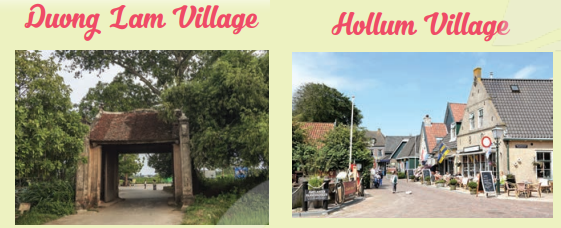
|
Statements |
Duong Lam |
Hollum |
|
1. It’s an ancient village. |
|
|
|
2. We can visit an ancient pagoda, traditional houses, and temples in this village. |
|
|
|
3. We can get there by plane or ferry. |
|
|
|
4. We can go there by car, bus or bike. |
|
|
|
5. It has a lighthouse. |
|
|
2. Read the text about life in a village in Viet Nam. Match the highlighted words in the text with their meanings.
(Đọc văn bản về cuộc sống ở một ngôi làng ở Việt Nam. Nối các từ được đánh dấu trong văn bản với ý nghĩa của chúng.)
I feel fortunate that I am living in a peaceful village in southern Viet Nam. The scenery here is beautiful and picturesque with vast fields stretching long distances. The houses are surrounded by green trees. There are lakes, ponds, and canals here and there. The air is fresh and cool. Life here seems to move more slowly than in cities. The people work very hard. They grow vegetables, cultivate rice, and raise cattle. At harvest time, they use combine harvesters to harvest their crops. Many families live by growing fruit trees in the orchards. Others live by fishing in lakes, ponds, and canals. Life in the village is very comfortable for children. They play traditional games. Sometimes they help their parents pick fruit and herd cattle.
People in my village know each other well. They are friendly and hospitable. They often meet each other in the evening, eating fruit, playing chess, singing folk songs, and chatting about everyday activities.
|
1. stretching |
a. small passages used for carrying water to fields, crops, etc. |
|
2. canals |
b. place where people grow fruit trees. |
|
3. cultivate |
c. covering a large area of land. |
|
4. orchards |
d. to grow plants or crops. |
2. Listen to three people talking about life in the countryside. Choose the opinion (A - C) that each speaker (1 - 3) expresses.
(Nghe ba người nói về cuộc sống ở nông thôn. Chọn ý kiến (A - C) mà mỗi người nói (1 - 3) thể hiện.)
|
Speaker 1 |
|
|
Speaker 2 |
|
|
Speaker 3 |
|
|
Opinions |
|
A. I don't like rural life because there are not many good schools and colleges. And entertainment and means of transport are very poor. |
|
B. I like rural life because the people here are close to each other. |
|
C. I want to live in the countryside because there are many things I can't easily do in the city. |
Vocabulary
1. Write the phrase from the box under the correct picture.
(Viết cụm từ từ hộp dưới hình ảnh đúng.)
|
unloading rice |
ploughing fields |
|
milking cows |
feeding pigs |
|
catching fish |
drying rice |
